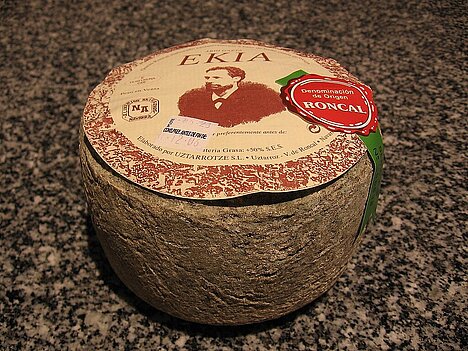Roncal

In the constant search for variation and quality in the diet of our four-legged friends, we sometimes stumble across foods that are not immediately associated with dog nutrition. One such food is Roncal, a cheese that is not only prized in human kitchens for its quality and flavor, but also brings interesting aspects to feeding dogs. In this article, we explore what exactly Roncal is and highlight the pros and cons of its use in dog nutrition.
What is Roncal?
Roncal is a Spanish hard cheese made from sheep's milk. It is particularly common in the Navarre region and was the first Spanish cheese to be awarded the protected designation of origin (PDO). This cheese is characterized by its rich, slightly spicy taste and is usually aged for between four and eight months.
Roncal in dog nutrition
At first glance, the idea of feeding dogs cheese like Roncal may seem surprising. Cheese is often used as a treat for dogs, but the specific properties and potential benefits of Roncal make it an interesting case. However, as with any food that is not traditionally part of a dog's diet, it is important to weigh up the pros and cons carefully.
Benefits of Roncal for dogs
Flavor that delights
Roncal has a strong flavor that can appeal to many dogs. As a reward in moderation, it can provide a tasty change of pace and increase interest in eating.
Nutrients in sheep's milk
Sheep's milk, from which Roncal is made, is rich in protein, calcium and essential fatty acids. These nutrients can contribute to a dog's overall health, especially strong bones and teeth.
Potential benefits for digestion
Cheese contains probiotics that can support gut health. However, the levels of these beneficial bacteria in different cheeses vary greatly, and the positive effect on digestion cannot be guaranteed.
Disadvantages and considerations
Lactose intolerance
Many dogs are lactose intolerant, which means they cannot effectively digest lactose. Although hard cheeses such as Roncal lose much of the lactose in the ripening process, the remainder can cause gastrointestinal problems in some dogs.
High fat content
Roncal, like most cheeses, contains a lot of fat. Excessive intake can lead to obesity and other health problems, especially in dogs prone to pancreatitis.
Salt content
Cheese also contains salt, which can be harmful to dogs in large quantities. Regular feeding of Roncal can increase the risk of heart and kidney problems.
Roncal offers an interesting way to enrich your dog's diet and add variety to his treats. The potential benefits, such as the protein and calcium content, make it worth considering. However, the risks should not be underestimated, especially for lactose intolerant or obesity-prone dogs. As with any supplement to the usual diet, it is important to use Roncal in moderation and to monitor your dog's reaction carefully.
If you notice any signs of hypersensitivity or poisoning in your dog, you should see your vet immediately. We are not a substitute for a vet, but we try to be as accurate as possible. Every dog reacts differently and we recommend you get a second opinion or consult your vet if in doubt.
Stay healthy and take good care of your four-legged friend!😊